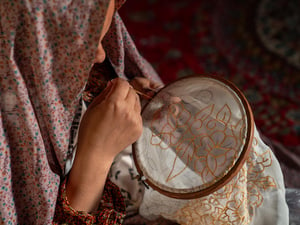UNHCR: Stabilization will require increased support for Afghanistan's returning refugees
UNHCR: Stabilization will require increased support for Afghanistan's returning refugees

A boy during a class in session at Primary School No. 9 in Tarakhail Daag, which was built with the support of UNHCR.
UNHCR, the UN Refugee Agency, is urging stronger investment in Afghanistan as the country stands before a critical juncture for peace and development.
Speaking today at the inauguration of a new primary school in Tarakhail Daag in eastern Kabul, UNHCR’s Director for Asia and the Pacific, Indrika Ratwatte, emphasized the need to strengthen services in the country’s Priority Areas of Return and Reintegration.
“Afghanistan’s efforts to reintegrate its people returning from exile must be met by commensurate commitment and partnership from the international community,” said Ratwatte.
“Robust services and support for those coming home are a fundamental precondition to the stabilization of Afghanistan and the prosperity of its people,” he added.
The now-40 Priority Areas of Return and Reintegration (PARRs) are a key component of UNHCR’s work to support the Government of the Islamic Republic of Afghanistan in strengthening essential facilities and infrastructure in communities to which Afghan refugees are voluntarily repatriating. This in turn fosters refugees’ safe and sustainable return. Areas are jointly identified by UNHCR and the Ministry of Refugees and Repatriation (MoRR), based on government development planning in the area and the presence of other stakeholders.
Return and reintegration efforts in Afghanistan are bolstered through the multi-stakeholder Support Platform for the Solutions Strategy for Afghan Refugees. In addition to enhancing assistance and investing in the human capital of Afghan refugees in the neighbouring host countries of Iran and Pakistan, the Platform cements greater responsibility-sharing through broadening partnerships and forging strategic linkages between humanitarian, development and peace investments. Under the Chairmanship of the European Union in 2021, the Platform’s Core Group includes MoRR, the UN Refugee Agency, UN Development Programme, Asian Development Bank World Bank and the Governments of Denmark, Germany, Japan, Korea, Qatar, Switzerland, Turkey, the United Kingdom and the United States respectively.
In 2016, some 7,000 Afghan refugees returning from Pakistan settled in Tarakhail Daag. Confronted with a largely barren landscape with limited access to critical services, they nevertheless chose to settle in the area; many returning families used UNHCR’s repatriation cash grants to buy land in Tarakhail Daag.
Since 2017, UNHCR and partners have established multi-purpose community centres, a printing press, schools, wells, shelter and solar water and power systems. Returning refugees and the existing host community have been trained in carpentry, metalwork, weaving and embroidery. Three medical clinics have been constructed and returnee women have been trained as midwives. Tarakhail Daag is also now home to some 250 internally displaced Afghan families.
Based on results since 2017, the Community-based Protection and Solutions Programme Response (Co-PROSPER) led by the Government of Afghanistan and UNHCR has been found to have had moderate to large positive impacts on households living in the PARRs. Significant gains have been made in peacebuilding and community cohesion, which households attribute directly to the support received. Despite this, access to livelihoods and further development in areas including health, water and sanitations remain needed.
“When we first came here, there were no services,” said Haji Gulam Khan Sultankhail, an elder of the community who returned to Afghanistan from Pakistan almost a decade ago.
“Today we have the basic services, and our children will have access to good education for a better future.”
For more infomation, please contact:
- At UNHCR Kabul, Tony Aseh, [email protected], +237 652 693 013
- At UNHCR Kabul, Mohammad Nader Farhad, [email protected], +93(0) 791 990 018
- At UNHCR Regional Bureau for Asia and the Pacific, Catherine Stubberfield, [email protected], +66 65 929 8062
- At UNHCR Regional Bureau for Asia and the Pacific, Kasita Rochanakorn, [email protected], +66 64 932 0803









